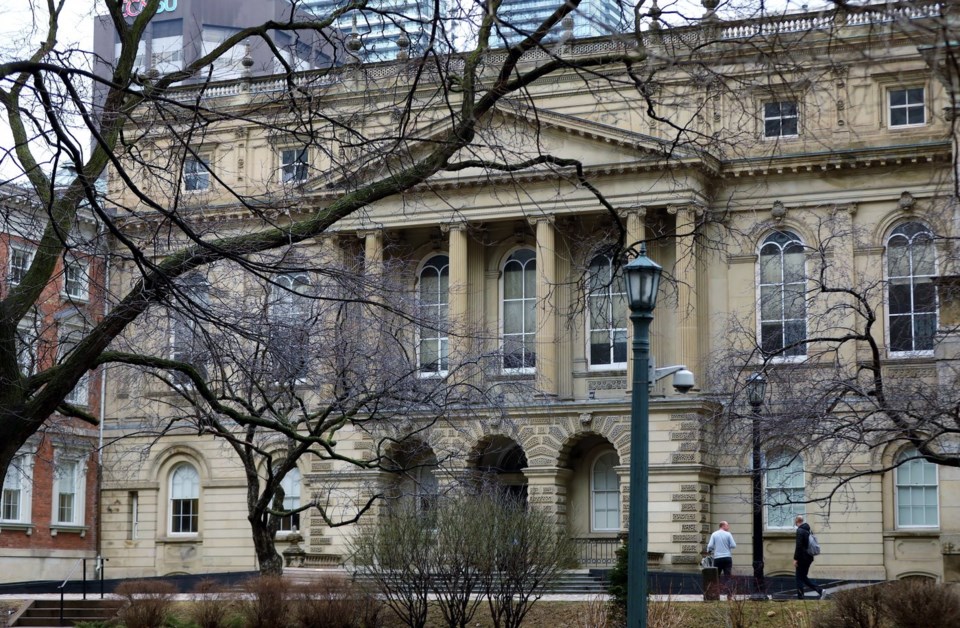TORONTO ŌĆö Ontario's top court breathed new life into a Charter challenge of the provincial government's emissions target on Thursday, a decision heralded as a major victory for the group of young people who brought the case and others looking to hold governments to account on climate change.
The Ontario Court of Appeal's ruling sends the case back to the lower court for a new hearing and revives the possibility that Ontario's weakened emissions target may still be found unconstitutional.
"The issues raised on the application must be considered afresh and through the correct analytical lens," Thursday's decision said, while poking holes in the lower court judge's original ruling.
The Appeal Court stopped short of making its own decision on the target's constitutionality or ordering the province to instead replace it with a "science-based" target, as the group had sought.
The Mathur v. Ontario case, named after lead applicant 17-year-old Sophia Mathur, is the first case to be tried in sa╣·╝╩┤½├Į that considers whether a government's climate-change approach has the potential to violate the Charter of Rights and Freedoms.
Mathur says although she and other youth can't yet vote, politicians need to be reminded "that they work for us."
"I believe that our case can make a real difference for young people in sa╣·╝╩┤½├Į and put Ontario back on track to take real climate action and start working for a safer future," she said during a virtual news conference Thursday.
"Our win today shows that our voices and concerns matter."
At stake was an emissions target that Premier Doug Ford's then-newly elected Progressive Conservative government set after it repealed the law underpinning Ontario's cap-and-trade system for lowering emissions.
The government scrapped the system in 2018 and replaced the emissions target in that law ŌĆö 37 per cent below 1990 levels by 2030 ŌĆö with a new target of 30 per cent below 2005 levels.
The young people brought evidence to suggest the revised target would allow for 30 megatonnes more in annual emissions leading up to 2030, equivalent to the annual emissions of about seven million passenger vehicles or nearly 200 megatonnes from 2018 to 2030.
In a decision last year, an Ontario Superior Court justice agreed the gap between how much emissions need to be cut globally and what the provincial plan calls for is "large, unexplained and without any apparent scientific basis."
The court also found that Ontario was increasing the risk of death faced by young people ŌĆö citing how climate change fuels forest fires, floods and infectious disease spread, and has a disproportionate impact on Indigenous youth ŌĆö by not taking steps to further reduce its emissions.
The ruling noted that to align with international standards, Ontario would need a more stringent target that aims for emissions to be half of what they were in 2005 by 2030.
But the judge disagreed that the province's emissions target amounted to a Charter violation. It wasn't that the province's target increased emissions, but that it allegedly did not do enough to reduce them.
The lower court judge ruled in dismissing the challenge that the applicants were trying to impose a "freestanding" obligation on the province to fight climate change.
The Appeal Court disagreed. Ontario had voluntarily made a statutory commitment to combat climate change, Thursday's ruling said.
"The question is whether the application judge should have considered whether Ontario's alleged failure to comply with its statutory obligation violated the appellants' Charter rights," the decision read.
In a written statement reacting to the decision, a spokesperson for Ontario's attorney general touted the province's investments in cleaner steel production and transit expansion.
"We are on track to meet emissions reduction targets and will continue to build on our success by ensuring Ontario remains a global leader," said Jack Fazzari, a press secretary for Attorney General Doug Downey.
The case is part of a wave of challenges in sa╣·╝╩┤½├Į and abroad asking courts to take a more active role in overseeing governments' climate plans.
The top court in the Netherlands ruled in 2019 that the Dutch government had a duty to protect citizens from the potentially devastating effects of climate change. It upheld lower court decisions that ordered the government to further cut emissions.
Thursday's ruling in Ontario has laid a "solid foundation" for a potential victory in the new hearing, said Stepan Wood, a professor at the University of British Columbia.
"This unanimous decision is a major victory for Canadian children and youth who are seeking to hold governments accountable for their contributions to climate change," Wood, a sa╣·╝╩┤½├Į Research Chair in law, society and sustainability, said in a written reaction to the decision.
Lawyers in another youth-led Charter challenge were watching closely, too. Their case, which challenges the federal government's overall climate plan, is currently before the Federal Court.
"TodayŌĆÖs decision is very significant because it confirms that climate change is causing severe harms in sa╣·╝╩┤½├Į, and that the government can be held to account for its role in causing those harms," said Catherine Boies Parker, a lawyer for the applicants in that case.
This report by The Canadian Press was first published Oct. 17, 2024.
Jordan Omstead, The Canadian Press



